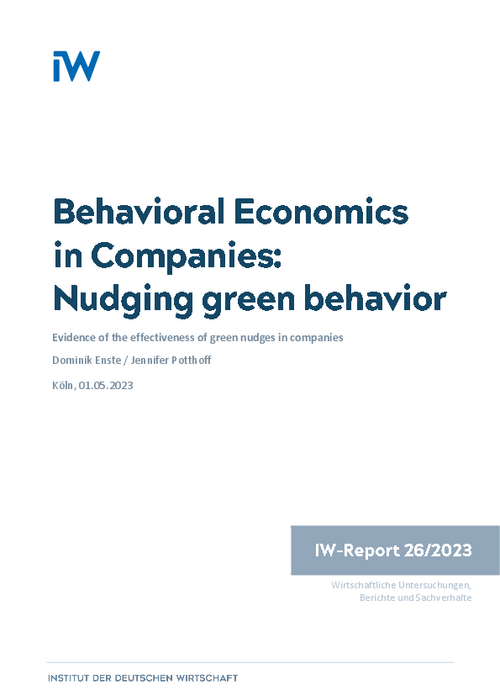Climate change, the finite nature of natural resources, a growing world population and the quest for prosperity challenge society and policy to act responsibly and sustainably. The debate on climate change and the upcoming energy transition was recently intensified by the Ukrainian war.

Behavioral Economics in Companies: Nudging green behavior

Climate change, the finite nature of natural resources, a growing world population and the quest for prosperity challenge society and policy to act responsibly and sustainably. The debate on climate change and the upcoming energy transition was recently intensified by the Ukrainian war.
The European Green Deal and the German climate package underline the political relevance of ecological sustainability in various fields of application, initiatives, and strategies at the federal and state level. In addition to the government and individual consumers, the public discussion and broad social consensus regarding climate neutrality also induce companies to act more responsibly and to make corporate structures ecologically more sustainable (Bauer, 2014, 4). Sustainability is no longer only a pending economic trend but rather a “must have” to exist and to compete in the market in the long-term. Companies are confronted with increasing pressure to act from different sides: not only political guidelines but also climate-conscious consumers, risk-conscious investors as well as industrial partners demand corporate climate protection (Ricci, 2021). Climate-friendly solutions are not only gaining importance in production, but also play a role in the design of office concepts. How can companies make a relevant contribution to ecological sustainability not only in their own production and manufacturing, but also in their day-to-day business in the headquarters and office buildings? What are the characteristics of the future model of progressive companies, the “Green office“, and how is it to be realized in practice?
To successfully implement greener behavior in corporations, it is not enough to implement ecological sustainability in a top-down approach. "This vision [of a full integration of ecological sustainability] is achieved when what has been documented as [ecologically] sustainable is also noticed in daily working life" (author’s own translation, Odgers Berndtson, 2021, 41). Corporate transformation to more ecological sustainability requires people who are willing to change and structures who enable change (Odgers Berndtson, 2021, 27 f., 43). But in contrast to their private lives, in the corporate context employees are not financially incentivized to act greener as they do not bear the company’s cost of unecological behavior.
Therefore, the question arises if and to what extent employees can be motivated to adopt greener behavior at work but without financial incentives? How do we manage to raise climate awareness and a change of behavior among employees so that there is a long-term common interest in implementing ecological sustainability strategies in the company? How can business leaders develop measures to motivate their employees towards greener behavior and to ensure that the gap between ecological aspiration and reality (Mind-Behavior-Gap) shrinks? This paper responds to these questions and gives impulses to use behavioral tools for ecological purposes in the corporate context. In addition to “Boosts” via more information, "Nudging", the systematic promotion of certain behavioral patterns, offers a promising path to a new awareness and behavioral change among office employees. The central aim of this paper is to investigate to what extent green nudges can be used to trigger climate-friendly behavior at the workplace. Based on an analysis of studies and experiments several nudging concepts are analyzed on their effectiveness regarding the three fields of action: energy efficiency, (sustainable) mobility and resource use. On this basis, final behavioral recommendations are derived for companies.

Behavioral Economics in Companies: Nudging green behavior

More on the topic

Leadership in transformation: Megatrends and management as a driver of change
Leadership dynamics in companies are subject to constant change in order to meet the challenges of their time. Today, the greatest influences result from developments such as demographic change, globalization, individualization, structural change and ...
IW
Green Nudging – a key against littering?
The demand for cleanliness in cities is increasing: "Littering" - the illegal littering of public spaces - does not only cause costs for the environment and society, but also has significant financial consequences through increased cleaning costs.
IW